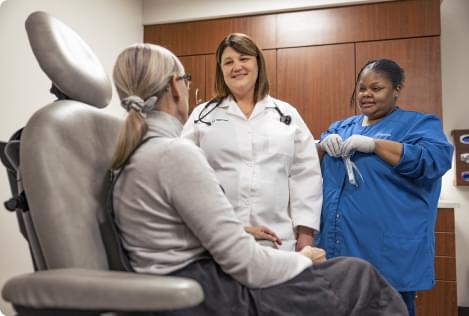| Study Name | Description | Trial Category | Trial SubCategory Sort descending |
|---|---|---|---|
| Crest 2 | The main purpose of the study is to find out if the incidence of stroke or death is different or the same between subjects that receive medical management alone compared to subjects that receive medical management in combination with carotid endarterectomy (CEA) or carotid artery stenting (CAS). | Heart & Vascular | Carotid Stenosis |
| TAPUR | The purpose of this study is find targeted treatment for patients with advanced cancer that has a actionable genomic variant revealed by genomic testing. Tissue from your cancer must be sent for genomic screening. You must have an advanced solid tumor, mulitple myeloma or B cell non-Hodgkin lymphona for which standard treatment options are no longer available. | Cancer | All tumor types |
| URCC 18007 | A study see if Bupropion is effective for reducing cancer-related fatigue. You must have completed surgery, radiation and/or IV chemo at least 2 months prior to enrollment. | Cancer | All tumor types |
| Bayer ON-TRK | The purpose of this study is to learn about the effectiveness of Vitrakvi in patients with TRK Fusion cancer. You must have a advanced solid tumor with a NTRK gene fusion. | Cancer | All tumor types |
| A212102 | This is a study looking at determining effectiveness of a multicancer early dectection blood test. Participants are healthy subjects, those with a known cancer diagnosis, and those with high suspicion of cancer. | Cancer | All tumor types |
| Destiny 614 | This is an open-label, multi-center, long-term study of patients with genetically-confirmed Prader-Willi Syndrome (PWS). | Endocrinology | Pediatrics |
| A022102 | The purpose of this study is to compare effectiveness of mFOLFIRINOX with or without nivolumab and mFOLFOX6 with or without nivolumab . You must have newly diagnosed metastatic HER2 negative gastroesophageal cancer. | Cancer | Esophageal |
| EA2183 | The purpose of this study is to determine if adding radiation to chemo is beneficial. You must be diagnosed with metastatic HER2 negative esophageal and gastric cancer. | Cancer | Esophageal |
| A221805 | This study is looking at using Duloxetine to prevent Oxaliplatin induced peripheral neuropathy. You must be diagnosed with stage 2 or 3 colorectal cancer scheduled to receive chemo with oxaliplatin. | Cancer | Colorectal |
| A022101 | The purpose of this study is to evaluate radiation, ablation and surgery. You must be diagnosed with metastatic colorectal cancer. The primary tumor must be able to surgically resected. | Cancer | Colorectal |
| A022104 | The purpose of this study is to look at the effectiveness of two chemo regimens mFOLFOX6 or CAPOX vs mFOLFIRINOX in getting patients to remission. You must be diagnosed with stage 2 or 3 rectal cancer. | Cancer | Rectal |
| A031702 | The purpose of this study is to look at the effectineness of cabozantinib combined with nivolumab and ipilimubmab. You must be diagnosed with a rare genitourinary tumor of the kidney, bladder, ureters or penis. | Cancer | Rare Genitourinary |
| S2200 | The purpose of this study is to compare treatment using cabozantinib with or without atezolizmab. You must be diagnosed with metastatic papillary renal cell cancer. | Cancer | Metastatic Renal Cell |
| GU012 | The purpose of this study is to compare standard immunotherapy with immunotherapy and radiation. You must be diagnosed with metastatic renal cell cancer and have not had surgery for this cancer. | Cancer | Metastatic Renal Cell |
| A031704 | The purpose of this study is to compare overall survival in patients treated with ipilimumab-nivolumab followed by either nivolumab or cabozantinib-nivolumab. You must be diagnosed with metastatic renal cell cancer. | Cancer | Metastatic Renal Cell |
| EA8211 | This study is for patients with renal cell cancer who have a total of 2-5 metastatic lesions. The study is looking at using radiation to the metastatic sites in combination with chemotherapy. | Cancer | Metastatic Renal Cell |
| A031902 | The purpose of this study is to evaluate progression free survival and overall survival with the use of enzalutamide and rucaparib vs enzalutamide alone. You must be diagnosed with metastatic castration-resistant prostate cancer. This must be your first treatment for your metastatic cancer. | Cancer | Metastatic Prostate |
| EA5163 | The purpose of this study is to evaluate overall survival using immunotherapy alone or in combination with chemotherapy in advanced non-squamous Non-Small Cell Lung Cancer (NSCLC). You must be diagnosed with stage 4 Non-Small Cell Lung Cancer (NSCLC). | Cancer | Non-Small Cell Lung |
| A151216 (ALCHEMIST) | The purpose of this study is to send tissue for screening of mutations to find targeted therapy for your cancer. You must be diagnosed with stage 1B, stage 2 or stage 3A resectable or completely resected non-small cell lung cancer (NSCLC). | Cancer | Non-Small Cell Lung |
| A081801 (sub study A151216) | The purpose of this study is to compare disease free survival when adding immunotherapy to initial chemotherapy vs immunotherapy only in maintenance therapy. You must be diagnosed with stage 2 or stage 3 non-small cell lung cancer (NSCLC). | Cancer | Non-Small Cell Lung |
| A082002 | The purpose of this study is to determine in SBRT (stereotactic body radiation therapy) improves survival in advanced stage NSCLC. You must be diagnosed with stage 3 or 4 Non-Small Cell Lung Cancer (NSCLC). | Cancer | Non-Small Cell Lung |
| NRG-LU008 | The purpose of this study is to compare chemo and radiation followed by immunotherapy vs SBRT (stereotactic body radiation therapy) to primary tumor follwed by chemo and radiation then immunotherapy. You must be diagnosed with Stage 2 or 3 non-small cell lung cancer (NSCLC). | Cancer | Non-Small Cell Lung |
| EA5182 | This study is comparing Osimertinib and Bevacizumab vs Osimertinib alone as first-line treatment for patients with metastatic EGFR mutant Non-Small Cell Lung Cancer (NSCLC). You must be diagnosed with stage 3 or 4 NSCLC. | Cancer | Non-Small Cell Lung |
| S1914 | This study is comparing the use of Atezolizumab + SBRT (stereotactic body radiation therapy) vs SBRT Alone in high risk early stage non-small cell lung cancer (NSCLC). You must be diagnosed with stage 1 or 2 non-small cell lung cancer (NSCLC). | Cancer | Non-Small Cell Lung |
| S2001 | The purpose of this study is to determine the effectiveness of Olaparib + Prembrolizumab vs Olaparib alone. You must be diagnosed with metastatic pancreatic cancer with a BRCA1 or BRCA2 mutation. | Cancer | Pancreatic |
| EAA173 | The purpose of this study is determine if dararumumab enhances the effectiveness of revlimid in patients with smoldering myeloma. You must be diagnosed with asymptomatic high risk smoldering multiple myeloma. | Cancer | Smoldering Myeloma |
| EAY191 ComboMATCH | The purpose of this study is to find targeted therapy for specific gene mutations in metastatic or advanced cancer. You must have progressed on standard of care treatment or have a cancer which has no standard of care treatment. If select mutations are found you may be eligible for a sub-study. | Cancer | Genomics |
| EAY191-A6 ComboMATCH | The purpose of this study is to see if adding Binimetinib in combination with FOLFOX is more effective treatment. You must be diagnosed with biliary tract cancer with a MAPK pathway gene mutation. | Cancer | Biliary |
| EAY191-E4 ComboMATCH | The purpose of this study is to determine the effectiveness of nilotinib and paclitaxel in patients with prior taxane treated solid tumors. You must have had at least one prior line of therapy in the metastatic setting. | Cancer | Solid Tumors |
| S2013 | The purpose of this study is the look at the side effects of immunotherapy treatment. You must be starting immunotherapy alone not in combination with other treatments. You must have a solid tumor. | Cancer | Solid Tumors |
Unsupported Browser! This website will offer limited functionality in this browser. We only support the recent versions of major browsers like Chrome, Firefox, Safari, and Edge.


